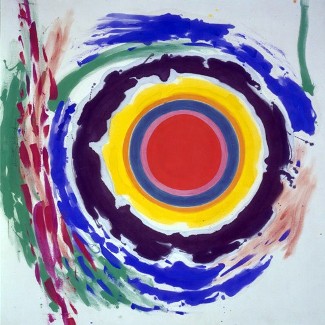In coaching a student in a master class, Alfred Brendel mentioned that very tapered phrase-endings may not allow for long-range musical continuity. If some notes in a cantabile phrase are much softer than the rest, those soft notes may seem to belong to another voice — they drop out of the line, or suggest a subsidiary one.
(In very soft tapering at the end of a melodic line, frequently I have the sense that pianists lose contact with the music, or with the process of music making, perhaps in the service of sonic detail. The prettiest moments may mark gaps of coherence.)
 Achieving long continuity in solo piano pieces is especially challenging. No other musicians to help the pianist along. No conductor…
Achieving long continuity in solo piano pieces is especially challenging. No other musicians to help the pianist along. No conductor…
The player’s own continuing (unwavering?) attention to the music really matters. And the achievement of that continuity may be rooted in physical behaviors.
What do we look at while playing? In a memory-performance, there’s no score to read. We may look at our hands and the keyboard. Or perhaps stare provocatively upward…at the heavens? To me it seems, a fairly limited range of vision will help us. If the head and eyes move very widely or very suddenly, continuity of sound and line are more difficult to achieve. (I’m not a fan of closed-eye playing either. Too much loss of contact with the real physical sound in the room, I believe.)
Some players, often of great intelligence, get into a condition of insufficiently-focussed hyperawareness. Their attention/consciousness is taking in so much, or too rapidly switching from awareness of one dimension, task, or idea to others. Physical vision may slightly blur, eyes not quite focussing.
Easily followed limits on the player’s field of vision can be a good technique for exploring this issue. “Look mostly at this spot on the wall in front of you.” Or, “Move your head and eyes only within these bounds.”
Stephen Hough described a series of caricatures of the pianist Benno Moisevitch. No matter the music, tempo, or mood, Moisevitch has unchanging posture and facial expression in the images. Without discussing how the music sounded, I can say that I expect he was able to hear very, very well.

Bruce, I really enjoy reading all your articles. I think you have an interesting take on things, and I find your writing to be fantastic. I think some pianists get so caught up in the song that they do not realize the facial expressions they are making. I don’t enjoy closed eyed piano playing either, I prefer to look at the keys and watch my hands.
Dear Bruce,
I really enjoyed this article, and your advice about not looking skyward with closed eyes was thought-provoking. I’ve included this post in a just published article on my online magazine, Grand Piano Passion™, called “Piano Practice: Top 5 News Articles in February.” I’m looking forward to becoming a regular reader of your blog.
Best,
Nancy Williams
I have had great students do a variety of things. One of my best students, who is 17 years old now, always played with his eyes closed. One time when I asked him, he said that he couldn’t “feel” the music with his eyes open as it was a big distraction. All the good ones that I have worked with find their own thing to focus on and go from there. It helps to be consistent.
I’m both a teacher and perpetual student of piano, and frequently I straddle both ends of this spectrum simultaneously. As a teacher, I suppose I’m an advocate of the continuing unwavering attention to the music making process you alluded to, since I teach meditation to my students, hoping to develop that faculty that allows us to simply be aware of what we’re doing in every moment. I work with my piano students off-keyboard on breath awareness through zazen (sitting) meditation. Of course, it takes time to develop proficiency at meditation, and the ability to stay in the moment at hand (no pun intended) does not happen overnight. It’s always a journey and a process. If you were to somehow be able to take a snapshot of the consciousness of a master pianist while playing, you would probably see the ability to stay with what you’re doing (sorry, can’t provide an image for this), neither jumping ahead or going back to a perceived mistake. In short, my students tell me that meditation increases focus many-fold, and I believe the best players to some extent have the ability to pinpoint awareness on the task at hand.